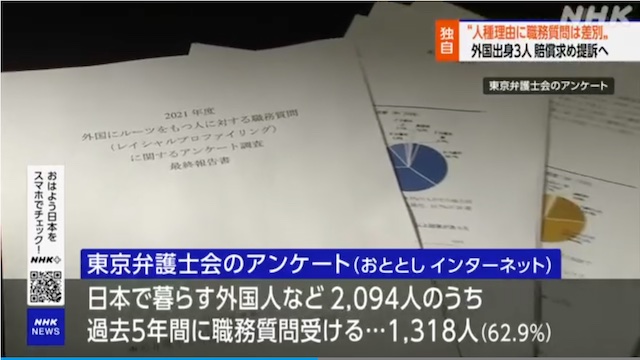TOKYO, Jan 24 (News On Japan) - Three individuals of foreign origin are set to file a lawsuit at the Tokyo District Court, claiming repeated police stop-and-frisks based on their race, skin color, and nationality constitute discrimination and violate the constitution.

This issue of stop-and-frisks based on race and nationality has been problematic internationally, and it is expected to be contested in Japan as well. According to their lawyer, the plaintiffs are three men residing in Tokyo and Aichi Prefecture, who have repeatedly experienced distress due to police questioning based on their appearance. One plaintiff alleges becoming reclusive after over 20 years of such encounters. The three are seeking 3 million yen each in damages from the national government, Tokyo, and Aichi Prefecture, claiming constitutional violations due to racial discrimination. Stop-and-frisks and interrogations based on race, skin color, or nationality, known as "racial profiling," are internationally contentious, with the UN Committee on the Elimination of Racial Discrimination recommending guidelines to prevent such practices.
The plaintiffs' attorney, Taiki Taniguchi, stated, "There are no precedents in Japan where the legality of stop-and-frisks, known as racial profiling, has been contested. This may be the first case. We hope the trial will prompt a review of police practices to align with international standards." In the previous year, the National Police Agency reported six incidents of inappropriate conduct during stop-and-frisks based on race and has committed to thorough guidance.
One plaintiff, Matthew (53), of Indian descent, came to Japan upon marrying a Japanese woman and has lived in Japan for over 20 years. During this time, he has been stopped by police officers at stations and on the streets, sometimes twice a day. He has been surrounded by several officers in front of his home and taken to the police station for questioning when he did not comply with a stop-and-frisk. Three years ago, while driving his wife to work in Tokyo, he was stopped by a police car with sirens blaring. When Matthew asked why he was stopped and if he was speeding, an officer replied it was unusual for a foreigner to be driving in the area. Matthew felt the police were misusing their power without valid reason, constituting an abuse of position and racial discrimination. The repeated stop-and-frisks made him fear going out, leading him to become reclusive. He said, "I always felt watched by the police, as if my privacy was being invaded. It happened so frequently that I wondered why it was always me." He decided to become a plaintiff in hopes that the trial would find a solution allowing everyone suffering from the same issue to live peacefully.
A survey by the Tokyo Bar Association last year found that over 60% of foreigners and Japanese with foreign parents living in Japan had been stopped by police in the past five years. Of those, 50.4% had been stopped two to five times, 10.8% six to nine times, and 11.5% ten times or more. When asked if they believed the police knew they were of foreign descent from the outset, 85.4% of those stopped said yes, with over 90% citing "physical features" as the reason. Others mentioned speaking in a language other than Japanese or carrying non-Japanese books or magazines. Free comments included sudden changes in the officer's attitude upon realizing the person was foreign, being questioned in an informal manner, being investigated in front of a crowd as if a criminal, and being suspected of carrying drugs based on appearance alone.
Source: NHK


 by
by 












